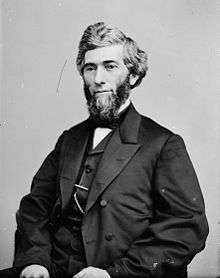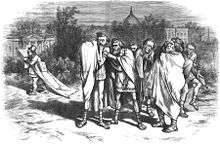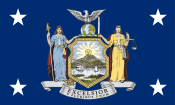Reuben Fenton
Reuben Eaton Fenton (July 4, 1819 – August 25, 1885) was an American merchant and politician from New York.
Reuben Eaton Fenton | |
|---|---|
 | |
| 22nd Governor of New York | |
| In office January 1, 1865 – December 31, 1868 | |
| Lieutenant | Thomas G. Alvord (1865–66) Stewart Woodford (1867–68) |
| Preceded by | Horatio Seymour |
| Succeeded by | John T. Hoffman |
| United States Senator from New York | |
| In office March 4, 1869 – March 3, 1875 | |
| Preceded by | Edwin D. Morgan |
| Succeeded by | Francis Kernan |
| Member of the U.S. House of Representatives from New York | |
| In office March 4, 1853 – March 3, 1855 | |
| Preceded by | Augustus P. Hascall |
| Succeeded by | Francis S. Edwards |
| Constituency | 33rd district |
| In office March 4, 1857 – December 20, 1864 | |
| Preceded by | Francis S. Edwards |
| Succeeded by | Henry Van Aernam |
| Constituency | 33rd district (1857–63) 31st district (1863–64) |
| Personal details | |
| Born | July 4, 1819 Carroll, New York, U.S. |
| Died | August 25, 1885 (aged 66) Jamestown, New York, U.S. |
| Political party | Democratic (Before 1857) Republican (1857–72, 1873–85) Liberal Republican (1872–73) |
| Spouse(s) | Jane Frew (m. 1840) Elizabeth Scudder (m. 1844; his death 1885) |
| Children | 4 |
| Education | Cary's Academy Fredonia Academy |
| Occupation | Attorney Businessman |
Early life
.png)
Fenton was born near Frewsburg, in Chautauqua County, New York on July 4, 1819.[1] He was the son of farmer, and schoolteacher, George Washington Fenton (1783–1860) and Elsey (née Owen) Fenton (1790–1875).[2] Among his siblings were Roswell Owen Fenton, George Washington Fenton Jr., William H.H. Fenton, and John Freeman Fenton.[3]
His paternal grandparents were Roswell Fenton and Deborah (née Freeman) Fenton and his maternal grandfather was John Owen of Carroll, New York.[3] His paternal aunt, Hannah Fenton was the wife of Lambert Van Buren of Kinderhook, New York.[4]
He was educated in the district school, Cary's Academy near Cincinnati, Ohio and the Fredonia Academy.[5]
Career
In 1840, he was named commander of the New York Militia's 162nd Infantry Regiment with the rank of colonel. He became a lumber merchant, studied law, and was admitted to the bar in 1841.[6] Fenton entered politics as a Democrat. He was Town Supervisor of Carroll from 1843 to 1850.[7]
U.S. House of Representatives
He was elected as a Democrat to the 33rd United States Congress, and served from March 4, 1853, to March 3, 1855. In his first term in Congress, Fenton strongly opposed the Kansas-Nebraska Act of 1854 and unsuccessfully tried to persuade President Franklin Pierce and U.S. Secretary of State William L. Marcy to oppose the bill. He was defeated for re-election that year. He left the Democratic Party to help organize the Republican Party,[6] and was later elected, as a Republican, to the 35th, 36th, 37th and 38th United States Congresses, and served from 1857 to 1865. During the 36th Congress, he served on the Committee on Invalid Pensions and in the 37th Congress, he served on the Committee on Claims.[7]
Governor of New York
He was Governor of New York from 1865 to 1868, elected in 1864 and 1866. "During his tenure, Cornell University was founded; a free public school system was initiated; and relief measures were sanctioned that benefited veterans."[8] After serving two terms as governor, Fenton lost the November 1868 election to John T. Hoffman, a Tammany-backed Democrat. In 1868, he was among the candidates to be Vice President but the nomination went eventually to Schuyler Colfax,[9] whom Fenton had previously been allied with in discussing "growing public agitation about" General George B. McClellan's inactivity with President Abraham Lincoln during the U.S. Civil War.[10]
U.S. Senator

In January 1869, he was elected a U.S. Senator from New York, succeeding Edwin D. Morgan and serving from 1869 to 1875 when Francis Kernan replaced him. While in the Senate, he served as Chair of the Committee to Audit and Control the Contingent Expenses during the 42nd Congress while also serving on the Committee on Manufactures and the Committee on Territories.[7] In 1872, he was among the Republicans opposed to President Ulysses S. Grant who joined the short-lived Liberal Republican Party.[11]
Later life
In 1878, Fenton represented the United States at the International Monetary Conference in Paris. He was known as "The Soldiers' Friend" for his efforts to help returning Civil War veterans. He worked to remove tuition charges for public education, helped to establish six schools for training teachers, and signed the charter for Cornell University.[12]
Personal life
In 1840, Fenton was married to Jane W. Frew (1821–1842), the daughter of John Frew. They had one daughter, Jane Frew Fenton. After his first wife's death in 1842 Jane went to live with her maternal grandparents. Reuben got remarried on June 12, 1844 to Elizabeth Scudder (1824–1901). Together, they were the parents of:[5]
- Josephine Fenton (1845–1928), who married Frank Edward Gifford (1845–1934).[5]
- Jeannette Fenton (1849–1924), who married Albert Gilbert (1851–1912).[5]
- Reuben Earle Fenton (1865–1895), who married Lillian Mai Hayden, daughter of Charles H. Hayden in 1890.[5]
Fenton died on August 25, 1885 in Jamestown,[13] and was buried in Lakeview Cemetery.[14]
Legacy
The town of Fenton in Broome County, New York is named for Reuben Fenton.
His former home in Jamestown is the site of the Fenton History Center. It was listed on the National Register of Historic Places in 1972.[15][16]
After his death, a building at The State University of New York at Fredonia, Fenton Hall, was named in his honor because he had attended the previous incarnation of the school, the Fredonia Academy.
References
- "Reuben Eaton Fenton Papers". www.nysl.nysed.gov. Manuscripts and Special Collections: New York State Library. Retrieved 5 December 2019.
- Maltby, Mrs Martha (Humphreys) (1918). Genealogical Gleanings of Siggins, and Other Pennsylvania Families: A Volume of History, Biography and Colonial, Revolutionary, Civil and Other War Records Including Names of Many Other Warren County Pioneers. Tiernan-Dart Printing Company. p. 16. Retrieved 5 December 2019.
- Schenck, J. S.; Rann, William S. (1887). History of Warren County, Pennsylvania: With Illustrations and Biographical Sketches of Some of Its Prominent Men and Pioneers. D. Mason & Company. p. 330. Retrieved 5 December 2019.
- Peckham, A.B., M.D., Harriett C. Waite Van Buren (1913). History of Cornelis Maessen Van Buren who came from Holland to the New Netherlands in 1631, and his descendants, including the genealogy of the family of BLOOMINGDALE who are descended from Maas, a son of Cornelis Masessen. Tobias A. Wright Printer and Publisher. p. 78. ISBN 978-5-87839-437-6. Retrieved 5 December 2019.CS1 maint: multiple names: authors list (link)
- Downs, John P.; Hedley, Fenwick Y. (1921). HISTORY CHAUTAUQUA COUNTY NEW YORK AND ITS PEOPLE, Vol. II (PDF). American Historical Society, Inc. Retrieved 5 December 2019.
- "Reuben Eaton Fenton Papers, 1854-1887 (finding aid)". New York State Library web site. New York State Library. Retrieved 25 November 2014.
- "FENTON, Reuben Eaton - Biographical Information". bioguide.congress.gov. Biographical Directory of the United States Congress. Retrieved 5 December 2019.
- "Reuben Eaton Fenton". nga.org. National Governors Association. Retrieved 5 December 2019.
- Hollister, Ovando James (1886). Life of Schuyler Colfax. Funk & Wagnalls. p. 322. Retrieved 5 December 2019.
- Lehrman, Lewis E. (2018). Lincoln & Churchill: Statesmen at War. Rowman & Littlefield. p. 125. ISBN 978-0-8117-6745-3. Retrieved 5 December 2019.
- Dunkelman, Mark H. (2015). Patrick Henry Jones: Irish American, Civil War General, and Gilded Age Politician. LSU Press. p. 94. ISBN 978-0-8071-5967-5. Retrieved 5 December 2019.
- Google Book Life Sketches of State Officers, Senators, and Members of Assembly in the State of New York in 1867 by S. R. Harlow and H. H. Boone (Weed, Parsons & Co., Albany NY, 1867)
- "Death of Ex-Gov. Fenton; He Dies Suddenly from Heart Disease. Jamestown in Mourning for the Loss of Its Leading Citizen--His Long and Useful Career" (PDF). The New York Times. 26 August 1885. Retrieved 5 December 2019.
- "Ex-Gov. Fenton Buried.; Laid at Rest in Lakeview Cemetery After Solemn Funeral Services" (PDF). The New York Times. 30 August 1885. Retrieved 5 December 2019.
- "National Register Information System". National Register of Historic Places. National Park Service. March 13, 2009.
- "Reuben E. Fenten". app.chautauquacounty.com. Fenton History Center, Jamestown, NY. 2013. Retrieved 5 December 2019.
External links
| Wikimedia Commons has media related to Reuben Fenton. |
- United States Congress. "Reuben Fenton (id: F000077)". Biographical Directory of the United States Congress.
- Reuben Fenton at Find a Grave
- Reuben Eaton Fenton Papers, 1854-1887 at the New York State Library
- Mr. Lincoln and New York: Reuben E. Fenton
| Party political offices | ||
|---|---|---|
| Preceded by James S. Wadsworth |
Republican nominee for Governor of New York 1864, 1866 |
Succeeded by John Augustus Griswold |
| U.S. House of Representatives | ||
| Preceded by Augustus P. Hascall |
Member of the U.S. House of Representatives from New York's 33rd congressional district March 4, 1853 – March 3, 1855 |
Succeeded by Francis S. Edwards |
| Preceded by Francis S. Edwards |
Member of the U.S. House of Representatives from New York's 33rd congressional district March 4, 1857 – March 3, 1863 |
District eliminated |
| Preceded by Burt Van Horn |
Member of the U.S. House of Representatives from New York's 31st congressional district March 4, 1863 – December 20, 1864 |
Succeeded by Henry Van Aernam |
| Political offices | ||
| Preceded by Horatio Seymour |
Governor of New York 1865–1868 |
Succeeded by John T. Hoffman |
| U.S. Senate | ||
| Preceded by Edwin D. Morgan |
U.S. senator (Class 1) from New York 1869–1875 Served alongside: Roscoe Conkling |
Succeeded by Francis Kernan |

